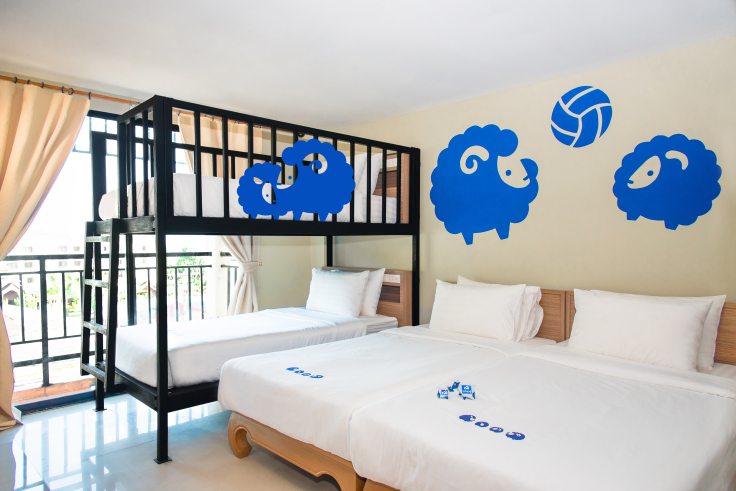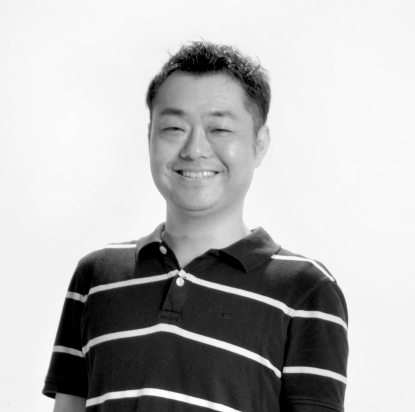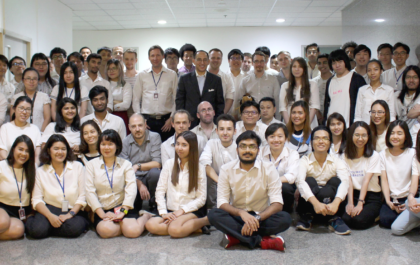Rei Matsuda, the soft spoken CEO of Newlegacy Hospitality, is a man with big dreams. He wants to open a thousand Kokotels, his unique hotel concept, in South East Asia. Not far out at all when you realize that he has managed to open 3 alone in the last quarter of 2017.
Kokotel blends Japanese hospitality and efficiency with European design and American standardisation To enter a Kokotel is to walk into an eclectic bistro/cafe with people mingling and children playing on slides, right next to the huge ‘Koko’ sheep mascots. You check in at the bar and choose a single or a double room like in most hotels but more than that, you have the choice of a 3 person room, or a family room complete with bunk beds for the kids. The atmosphere is convivial, comfortable, safe, high quality and easy on your wallet.
It’s no wonder that Rei’s flock of Kokos is rapidly multiplying.
Rei Matsuda can be reached at [email protected]. Also, check out Kokotel’s website at kokotel.com .

GenUp: Hi, Rei. Could you tell us something about yourself?
Rei: Yes, sure, I was born in Japan and the environment of my childhood was not really entrepreneurial. My father is an independent, leadership coach. He worked for a professional firm and then he became independent in 1985, when he was about 42 or 43. My mom was a kindergarten teacher, and so is my sister. In fact they are in the same school. So teaching and education is what my parents and sisters do. My brother is a therapist for professional athletes, and also intends to go independent soon.
GenUp: So going at it alone seems to very much be a part of your family tradition.
Rei: Yes, that’s true. Not so much business but self employed and not working for a large company. My first job was working for NEC, a large company that I left nine months later which was a big deal at the time, but my parents said that’s okay, if this is what you do, it’s okay for us.
GenUp: And is this your first foray into your own business?
Rei: Well, yes this is my first business but before this, I opened and ran a small office in Singapore for a Japanese consulting firm, called Dream Incubator. That may be considered to be about three and a half years of pre-entrepreneurial experience, in the sense that I did it all myself. Opened a new office, hired the people and ran the business.
GenUp: You mentioned to me earlier that you’ve also had some experience with Venture Capital?
Rei: Right, that was with Dream Incubator, 10 years before coming to Singapore and yes, I was exposed to a lot of entrepreneurs at the time. With my office in Singapore, though, it was more private equity investment and we consulted and helped Japanese corporations set up joint venture and do business with India, and vice versa helping Indian corporations like the Tata group do business with Japanese companies. So that is the reason that I still like to do business with India.

GenUp: What was the initial spark for Kokotel? How did you arrive at this idea and niche?
Rei: So two things happened together. First is that I met this investor, Mr. Morofuji. I don’t quite remember the details but I talked to him about hotels business in general and some time later he sent me an email saying that he would be interested in investing in the hotel business, and told me to come up with an idea. So it was actually him that got me started. At the same time, I learned the business model of the Chinese style economy hotel which is very different from what I learned in hotel school in the US, or from my brief time at the Intercontinental Hotel in Singapore. It was a five star luxury concept vs the three star budget mindset in China. So I was very impressed by their business model and the growth path.
GenUp: So you were more impressed with the Chinese model rather than the conventional Western model?
Rei: Yes, I often joke that I am a Japanese guy copying a Chinese business. In China there are 5 hotel chains with more than a thousand hotels. All of them happened in the last 10 years. So it was crazy fast, like 100 or 200 hotels every year. This expansion could not happen for a Marriott or a Hilton or any five star. Then I found that it was due to their small size and very centralized and standardized operation. And so that gave me the idea that I wanted to do something like that. Since then our business model has shifted to something a little more different, more design oriented, more family with a food and beverage component. The reason I wanted to go to hotel school was because I felt that the hotel is a form of entertainment business. I was actually interested in the movie and film business before and I even went to Hollywood to try to get into the business. I was also interested in sports in terms of sports management. And then I thought about hotels and decided that it was a form of entertainment and so decided to go to hotel school. I wanted to apply my ‘hotel as entertainment’ idea to the Chinese economy hotel model. I still wanted their scalability but I wanted to add design elements like a European hotel, and the efficiency of a Japanese hotel. So I’m greedy, I want everything. Scalability, Design and Efficiency.
GenUp: So I guess that your business is Venture capital funded?
Rei: I did invest some money but it is a minor investment. More than 90% is funded by REAPRA. It’s almost like the owner’s personal fund so he can own different businesses. The name REAPRA comes from “Research and Practice”, so he invests and of course he needs to get a return, but at the same time this is his learning process. He is interested to understand what types of businesses work, and what kinds of entrepreneurs will be successful. I wouldn’t quite say it is his hobby but it is definitely his learning process.
GenUp: Rei, talk to us about Kokotel. It has made a name for itself in a very short time.
Rei: Kokotel is a family oriented economy hotel. We have two sets of customers. One set is the hotel guest. The other is the hotel or property owner. We provide solutions to hotel guests who have a difficult time finding a good hotel for families to stay, so targeting females and families and provide them an affordable, clean, fun accommodation. So that’s one side of the business, the front end. The other side is a solution for hotel and property owners who own small hotels. They want to keep the asset as it is but do not want to operate the hotel by themselves. And there are lot of them. If you are big, there are many choices of finding a hotel operator but if you are small, like say less than 150 rooms it is very difficult to find a good operator. So we provide a solution to operate on behalf of the owner, under a leasing or a management contract. The owner is able to relax and enjoy cash flow from the property.
GenUp: How are you able to find the properties to run?
Rei: In many cases, property agents bring us proposals, we have referrals from owners to their friends and so on. It is very much about relationship. At times, a hotel guest may come to the front office to say that they like the concept and they have a hotel for us to run.
GenUp: And going back to the first side, the front end of your business. Can you tell us a bit more about them?
Rei: Yes, I feel that female travelers definitely overpay for hotels, since safety is important for them and so they choose to stay in branded hotels. Of course, they would rather stay in a cheaper place and spend their budget on other things. I feel that there is a nice niche if the female and family tourists can stay in a cheaper place but still feel a sense of security and comfort.
GenUp: How do guests find you? What is your marketing channel?
Rei: We don’t spend too much on marketing, honestly. People find us from all over the world through online travel agencies like Agoda, Expedia and Booking. Agoda is popular in Asia, Booking is popular in Europe and Expedia in the USA. So they look at our reviews, comments and scores and they make the decision.
Our website has many languages too and it helps when guests search in their own language. We also provide answers to their reviews in their own language, so we answer in Chinese, Russian, Japanese and so on. It is important to respond, especially to negative reviews.
GenUp: Why did you choose Thailand as your main and first market?
Rei: I picked Thailand because I noticed many potential properties that we could operate. Because of the transit system in Bangkok, there are a lot of hotels in their vicinity but poorly managed. So I actually picked Bangkok rather than Thailand. Before this I was in Singapore and I did a lot of business there and in India and in Jakarta. But Jakarta, there wasn’t a good public transportation and it was hard to know which location was good. And India, I thought to set up a brand new business there would be tough. I shortlisted KL and Bangkok and picked Bangkok. Also, of course, Bangkok is well known among travelers and the numbers have growing. And it is an easy place to do business.
GenUp: After facing the reality on the ground, has it matched what you expected in your business plan? Or have you had to be flexible and deviate and pivot?
Rei: I think there were many deviations. One was that I was focusing on Bangkok so much in the beginning and I expected to have at least 10 hotels or more in Bangkok before moving on to other places. But many good opportunities presented themselves from outside, like in Krabi and Phuket. We are also right now working on projects in Chiangmai and Koh Samui. And so we look and continue to be open to take advantage of those opportunities. The other thing is I realized that I need a lot more people to operate, much more than I originally expected.
GenUp: What were your hurdles and how hard was it for you to actually start and get the business off the ground?
Rei: Yes, oh boy, many mistakes. The biggest of which I feel was our over reliance on outside professional companies and depending on them too much without looking at the issues closely ourselves. Especially having to do with choosing and operating a property. The process just took much longer and costs were very high. For me, it is always a tough balance between respecting a professional and intervening as a business owner. It was challenging for me since I was new to business and new to Thailand with no specific skills in any field, like IT and Accounting, or Engineering.
GenUp: So would you be more hands on in future?
Rei: Not totally hands on, but definitely more questions, more updates and more follow throughs and follow ups. For example, ask them questions about why would they do things a certain way, or if they give a timeline of a month, I would break it down to weekly and make them accountable for that. So it’s a big learning experience, also for when we move to other markets like Myanmar, Vietnam or the Philippines.
GenUp: How do you handle setbacks and stay motivated? Any tips or strategies?
Rei: One thing definitely is my peers and colleagues. If I did this all myself, I don’t think I would be strong enough. If I do it like my father did, everything on his own, I would feel too isolated and not connected. But I have a lot of people to work with, and since I initiated everything I feel that I must constantly do better. That is big motivator for me. I’m not at all a controlling person. In fact we did a psychological test in our company the other day and I got the lowest score in independency. So apparently I am a very dependent personality, perhaps because of being the youngest in my family. So I’m a CEO who is dependent on his people. So my main motivators are my colleagues and my customers and the positive impact I can have on both of them. That’s my raison d’être and that drives me. So for example, when I visit one of our properties and I see a child happily playing on a slide, I feel good about that. My colleagues, my customers and I have come together to make that positive impact for that child.

GenUp: Who do you admire?
Rei: I really like the story of Honda motors, and how it started. There are two partners, Mr. Honda and Mr. Fujisawa. Honda was the engineer and Fujisawa was the business person. When they started they were around 40 years old, my age, and they worked together for 25 years after that. So it was my impression from a young age that this period after 40 to 65 was prime time. So everything until now seemed like preparation for this time of my life, and I’ve finally started.
So as an entrepreneur it may seem like I’m quite old, but for me, I feel that it is just right. If had started at 25 say, I wouldn’t have been able to do this. So their story is very inspiring, always thinking about the benefit of the society and not so much on the short term interest of the company. For example they focused on the safety of the car and doing right by their staff, their customers. So they had strong principles ingrained into their corporate culture. They had a very good DNA.
GenUp: What don’t you like about being an entrepreneur?
Rei: Well, that’s an easy question for me. There is a lot I like but the one thing that I don’t is that it is very difficult to get feedback on my own performance. For example, in a corporate setting there are annual performance reviews done and there is feedback from your boss. I mean, in my company we do this between the COO and CEO but as time goes on it is getting very tough to do. As the company gets bigger, it feels like I’m getting further away from my people to be able to get an accurate feedback. When I was young, and there was a small comment that my boss made about my performance and I still remember that. Any feedback is important and now I’m the one giving most of the feedback and I don’t know if I’m doing enough to help them. I often wonder where’s my feedback. We do have a mechanism for upward feedback but it is not so easy.
GenUp: What does success in life mean to you?
Rei: To me, success is creating a legacy for the next generation. Creating something new and long term that lasts until my great grand son’s age. I’m not really a trend chaser, going after the next big thing, make money and cash out. I want do something that is long term. Like Disney, still relevant, like Kurosawa’s films from 50 years ago are still enjoyed, or like Honda from more than 70 years ago.
GenUp: Thank you so much, it was wonderful talking with you, Rei.
Rei: My pleasure !
Genup: Where can we go to learn more?
Related posts
1 Comment
Comments are closed.
Today's pick
Hot topics
Welcome to Generation Upstart
It starts with an idea — a fusion of thoughts and experiences, a blending of desires and dreams. Bursts of electricity fueled with faith, love and creativity leap across synapses generating the necessary expression to give it real form and substance. Sometimes, an entrepreneur’s call…
Careerlist: Never Waste a Crisis
According to Michael Scissons, the most important thing you can do to maximize your chance of entrepreneurial success is to build your tribe. Start as early as possible, trimming and pruning like a patient gardener, while continuing to add value to the network. For these…
RingZero: On Employee Satisfaction and Success
Great people make the great teams that make the great workplaces, and Mr. Asmat Yousri is a big believer in people. After all, he has been at this since 1996. An ex-banker, he saw no obstacles transitioning from a corporate position to an entrepreneur. In…




Thanks for your marvelous posting! I truly enjoyed reading it, you might be a great author.I will
remember to bookmark your blog and may come back at some point.
I want to encourage you to continue your great job, have a nice holiday weekend!
Visit my web site: Royal CBD